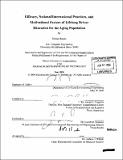| dc.contributor.advisor | Joseph F. Coughlin. | en_US |
| dc.contributor.author | Israels, Richard (Richard Steven) | en_US |
| dc.contributor.other | Massachusetts Institute of Technology. Dept. of Civil and Environmental Engineering. | en_US |
| dc.date.accessioned | 2006-11-07T13:34:00Z | |
| dc.date.available | 2006-11-07T13:34:00Z | |
| dc.date.copyright | 2006 | en_US |
| dc.date.issued | 2006 | en_US |
| dc.identifier.uri | http://hdl.handle.net/1721.1/34606 | |
| dc.description | Thesis (S.M.)--Massachusetts Institute of Technology, Dept. of Civil and Environmental Engineering, 2006. | en_US |
| dc.description | Includes bibliographical references (leaves 144-152). | en_US |
| dc.description.abstract | In a society facing a significant increase in its aging population, older driver education/training is emerging as a potential solution to help seniors drive more safely, thus maintaining their mobility and quality of life. Nonetheless, sufficient evidence has not emerged directly linking such programs to significant reductions in accident rates for seniors. But older driver education has produced certain outcomes that have been indirectly linked to driver safety. Among these secondary outcomes that led to significant reductions in crash rates are increases in self-regulation (i.e., modifying driving behavior to compensate for certain physical limitations) and a measure of visual/perceptual ability called Useful Field of View (UFOV). Despite some questions surrounding the efficacy of these programs, older driver courses are offered in the United States and internationally among various countries of the Organization for Economic Cooperation and Development (OECD). Many of the courses address similar core topics such as the effects on driving from certain physiological, cognitive changes that accompany aging. On the other hand, the programs can vary more on structural/administrative factors. For example, many courses in Europe offer behind the wheel training to supplement the material learned in the classroom. | en_US |
| dc.description.abstract | (cont.) For other courses, including those in the United States, the teaching approach is confined more to lectures. Often, the primary incentive for attending the domestic classes is a reduction in auto insurance premiums upon graduating. But in other states like Massachusetts such a discount is not offered. To more closely examine the motivations of older drivers without such an incentive, a survey was conducted on two sets of adults: one group who enrolled in a senior driver course in Massachusetts and another that chose not to take the course. An analysis of the survey findings indicated the primary reason the first group took the course was to be a "safer driver". In addition, that there are significant differences between the two groups on several fronts, including levels, types of motivation, systematic factors such as demographics and health conditions, and their attitudes about driving and older driver edlucation in general. Based upon the findings on motivation, efficacy, and domestic/international programs in older driver education, some ideas have been formulated for potentially improving the safety benefit of older driver education. | en_US |
| dc.description.abstract | (cont.) The proposals cover both structural/administrative (e.g., incentives offered to students, instruction fees), institutional (e.g., formation of public/private partnerships) and curriculum based enhancements. The effectiveness of such courses with these recommended features in reducing crash rates, directly or indirectly through the secondary measures, is a topic for additional research. | en_US |
| dc.description.statementofresponsibility | by Richard Israels. | en_US |
| dc.format.extent | 182 leaves | en_US |
| dc.format.extent | 10929297 bytes | |
| dc.format.extent | 10936965 bytes | |
| dc.format.mimetype | application/pdf | |
| dc.format.mimetype | application/pdf | |
| dc.language.iso | eng | en_US |
| dc.publisher | Massachusetts Institute of Technology | en_US |
| dc.rights | M.I.T. theses are protected by copyright. They may be viewed from this source for any purpose, but reproduction or distribution in any format is prohibited without written permission. See provided URL for inquiries about permission. | en_US |
| dc.rights.uri | http://dspace.mit.edu/handle/1721.1/7582 | |
| dc.subject | Civil and Environmental Engineering. | en_US |
| dc.title | Efficacy, national/international practices and motivational factors of lifelong driver education for the aging population | en_US |
| dc.type | Thesis | en_US |
| dc.description.degree | S.M. | en_US |
| dc.contributor.department | Massachusetts Institute of Technology. Department of Civil and Environmental Engineering | |
| dc.identifier.oclc | 71296044 | en_US |

